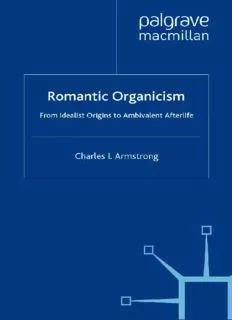
Romantic Organicism: From Idealist Origins to Ambivalent Afterlife PDF
Preview Romantic Organicism: From Idealist Origins to Ambivalent Afterlife
Romantic Organicism This page intentionally left blank Romantic Organicism From Idealist Origins to Ambivalent Afterlife Charles I. Armstrong Associate Professor University of Bergen Norway © Charles I. Armstrong 2003 Softcover reprint of the hardcover 1st edition 2003 978-1-4039-0475-1 All rights reserved. No reproduction, copy or transmission of this publication may be made without written permission. No paragraph of this publication may be reproduced, copied or transmitted save with written permission or in accordance with the provisions of the Copyright, Designs and Patents Act 1988, or under the terms of any licence permitting limited copying issued by the Copyright Licensing Agency, 90 Tottenham Court Road, London W1T 4LP. Any person who does any unauthorised act in relation to this publication may be liable to criminal prosecution and civil claims for damages. The author has asserted his right to be identified as the author of this work in accordance with the Copyright, Designs and Patents Act 1988. First published 2003 by PALGRAVE MACMILLAN Houndmills, Basingstoke, Hampshire RG21 6XS and 175 Fifth Avenue, New York, N. Y. 10010 Companies and representatives throughout the world PALGRAVE MACMILLAN is the global academic imprint of the Palgrave Macmillan division of St. Martin’s Press, LLC and of Palgrave Macmillan Ltd. Macmillan® is a registered trademark in the United States, United Kingdom and other countries. Palgrave is a registered trademark in the European Union and other countries. ISBN 978-1-349-50951-5 ISBN 978-0-230-28775-4 (eBook) DOI 10.1057/9780230287754 This book is printed on paper suitable for recycling and made from fully managed and sustained forest sources. A catalogue record for this book is available from the British Library. Library of Congress Cataloging-in-Publication Data Armstrong, Charles I., 1969– Romantic organicism: from idealist origins to ambivalent afterlife/Charles I. Armstrong. p. cm. Includes bibliographical references and index. ISBN 978-1-349-50951-5 1. English literature–19th century–History and criticism. 2. English literature–German influences. 3. Philosophy, German–18th century. 4. Romanticism–Great Britain. 5. Philosophy in literature. 6. Romanticism–Germany. 7. Organicism (Philosophy) I. Title. PR457 .A76 2003 820.9′145–dc21 2002042820 10 9 8 7 6 5 4 3 2 1 12 11 10 09 08 07 06 05 04 03 I (said he) hunt by the eye, like a Grey-hound. I see what my Object is: and dash in a strait line towards it. But you hunt with your nose to the earth: track the Prey thro’ every bend & zigzag, in and out thro’ the whole maze of Puss’ or Renyard’s Feet – and at the end what do you catch? – Why the Scent, perhaps, of the Hare or Vermin which I had killed an hour before, after a five minutes’ Run. (Samuel Taylor Coleridge, in a letter to James Gillman, Jr, 24 October 1826) This page intentionally left blank Contents Acknowledgements ix 1. First Articulations 1 Part I German Idealism and Frühromantik 2. Absolute Organicism in German Idealism: Kant, Fichte and Schelling 13 3. Prefaces to the New Gospel: Friedrich Schlegel and the Fragment 30 Part II English Romanticism 4. Organic Vagaries: Coleridge’s Theoretical Work 51 5. Early Affinities: Friendship and Coleridge’s Conversation Poems 81 6. On the Threshold: Wordsworth’s Architectonics of the Absolute 107 Part III Modern Theory 7. Balance and Extremity: A Comparison of Richards and Bataille 133 8. The Connections of Significance: Gadamer and the Vitality of Understanding 149 9. On the Double: Blanchot, Derrida and the Step Beyond 160 10. Ending the Automatic 182 Notes 187 Bibliography 215 Index 225 vii This page intentionally left blank Acknowledgements This book was made possible by a grant from the Norwegian Research Council (Norges Forskningsråd). Thanks are due the staff and students of both the department of Comparative Literature (Allmenn litteraturviten- skap) and the department of English at the University of Bergen, Norway, who have provided me with constructive working environments. I am indebted to the expertise and unfailing encouragement of Ellen Mortensen. Dag Andersson (University of Tromsø), Simon Critchley (University of Essex), Paul Hamilton (Queen Mary and Westfield University), Hans Hauge (University of Aarhus), and Gisle Selnes (University of Bergen) have read my manuscript at various stages of completion, all responding generously with tips and suggestions. I would also like to thank Per Buvik, Rune Falch, Erik Bjerck Hagen, Nils-Øivind Haagensen, Atle Kittang, Ingrid Nielsen, Frode Helmich Pedersen, Stuart Sillars, Nora Simonhjell, Torgeir Skorgen, Lars Sætre, and Tiril Broch Aakre, as well as Emily Rosser and Rebecca Mashayekh at Palgrave Macmillan, for their assistance. I am especially grateful to Inger Margrethe Stoveland, my father Richard J. Armstrong, and all other family members and friends for their support. An early extract from chapter 2 was presented at a seminar in Norheimsund, and parts of the same chapter have since appeared in the Norwegian article ‘Fra kritikk til organisme: Systemtenkning i Kant og den tyske idealismen,’ published in Prosopopeia(number 2, 2001), 50–8. An abridged and modified version of a section of chapter 4 has been pub- lished as ‘The Absolute Implied: Coleridge on Wordsworth and the Bible,’ in Literature and Theology(Vol. 14, number 4, December 2000), 363–72. A manuscript based on parts of chapter 5 was presented to the Coleridge Summer Conference at Cannington in 1998, and was subsequently pub- lished as ‘The Deferences of Friendship: Between Poetry and Prayer in Coleridge’s Conversation Poems,’ in the Coleridge Bulletin(Number 14 (NS), Autumn 1999), 40–6.
